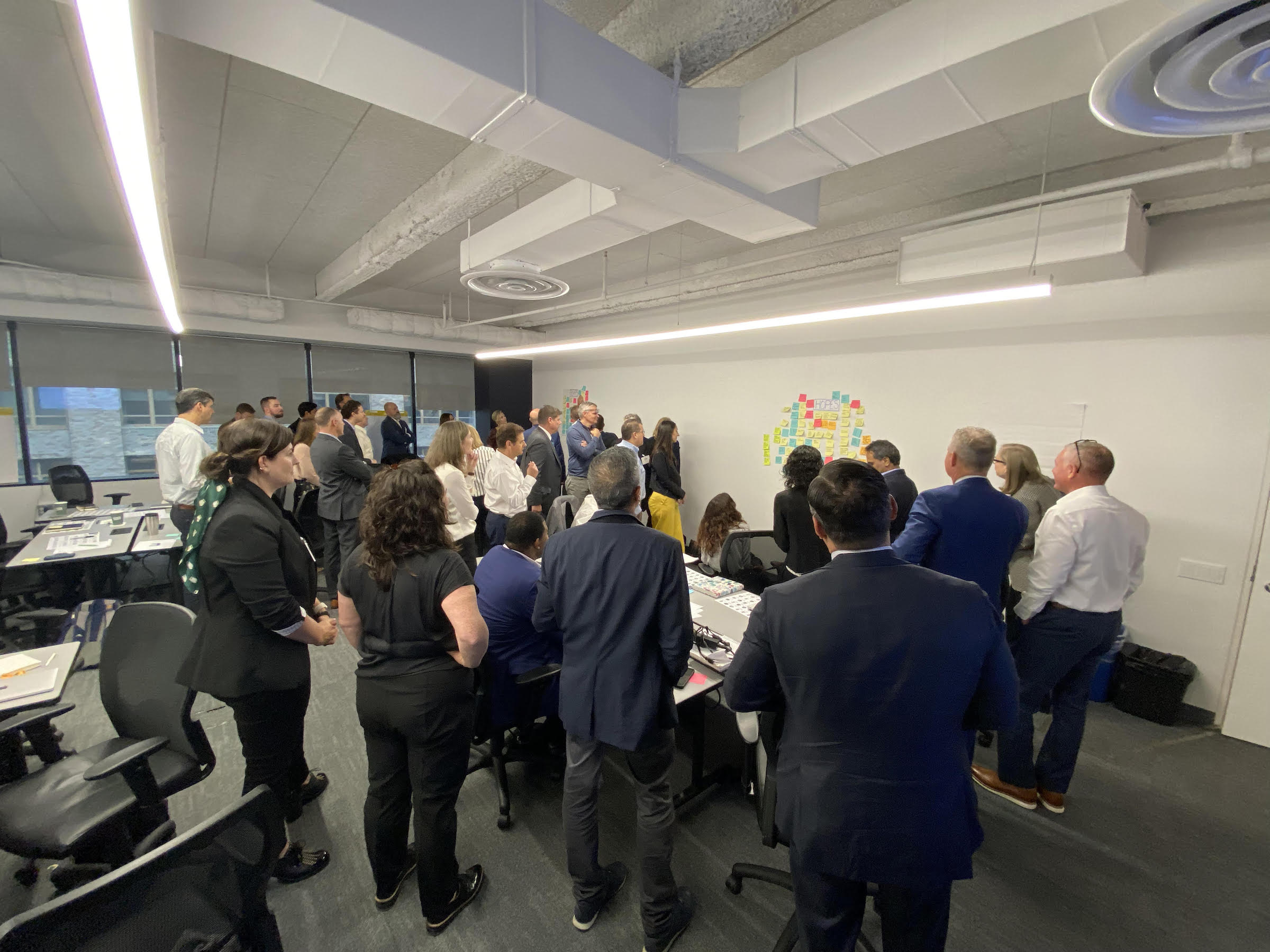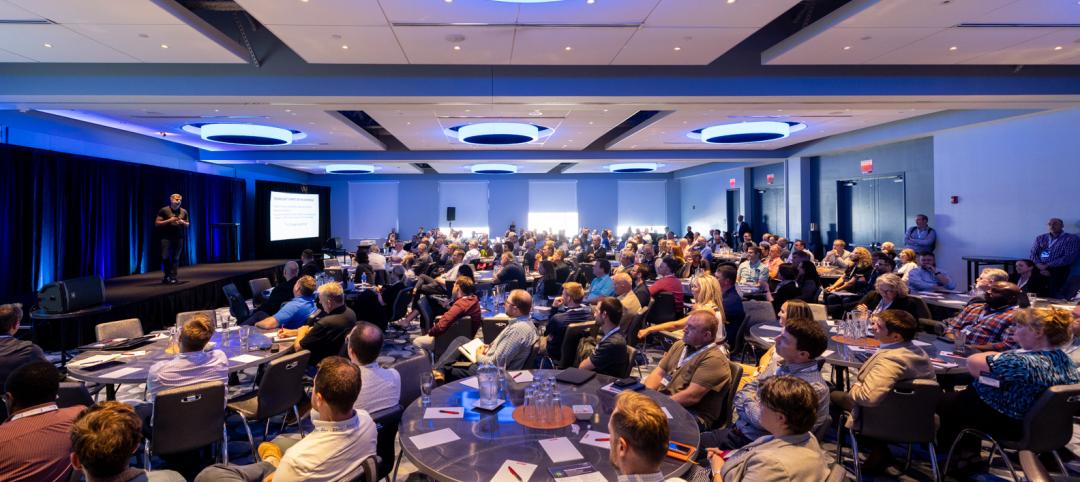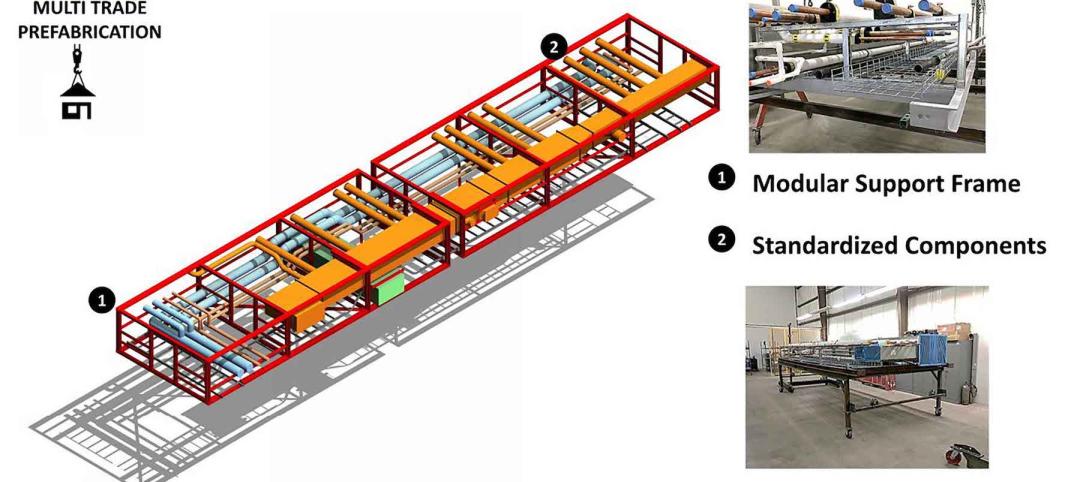The New Canaan Library in Connecticut is scheduled to open this February. The $38.5 million, 42,000-sf library is the first building project in the U.S. for Design for Freedom, a three-year-old movement in partnership with more than 80 construction industry leaders dedicated to identifying and disrupting the use of slave labor in the building materials supply chain.
On the library project, which is positioned as a knowledge and learning center, Design for Freedom collaborated with Centerbrook Architects, Turner Construction, and 21 subcontractors to trace 30 raw and composite building materials as far as possible within the supply chain.
This collaboration is a stepping stone in Turner’s broader sustainability strategy that is informed by environmental, social, and governance (ESG) criteria. In support of that strategy, Turner hosted a one-day ESG Sustainability Summit last November that was facilitated by Deloitte and attended by 45 industry leaders representing 18 companies that included AEC firms FXCollaborative and NBBJ, and suppliers Nucor, Johnson Controls, Hilti, Otis, and Schneider Electric.
Representatives from Design for Freedom presented at the event. Turner’s commitment to that movement is “vertically galvanizing the AEC industry globally,” said Sharon Prince, Founder of Grace Farms Foundation, from which the movement emanated. (Download the Design for Freedom report - PDF) See also BD+C Executive Editor Rob Cassidy's interview with Sharon Prince, DFF Founder, on Horizon TV: "Design for Freedom: Ending Slavery and Child Labor in the Global Building Materials Sector."
ESG is now part of the DNA of a growing number of AEC firms—including Gensler, Thornton Tomasetti, Perkins and Will, Gilbane, Arup, and Jacobs, to single out a prominent few—that have committed their business practices to following principles that promote equity, social justice, and governance. However, the execution of such strategies is easier said than done and politically fraught, especially when it comes to calling out a manufacturer’s or country’s labor practices in the supply chain.
“During Covid, we got a lot smarter about where things were coming from,” recalls Chris McFadden, Turner’s Vice President of Communications and Marketing. “But that led to deeper questions, and we realized that we needed a larger assemblage of people. That’s why we held the summit.”
When established companies like Turner are looking to set up ESG criteria, they usually start by conducting a “materiality assessment” that gauges what’s important for its stakeholders. The summit “was the beginning of a journey,” says Peter Hamill, Senior Vice President at Turner’s Boston office, who is spearheading its sustainability strategy.

While he candidly admits that Turner “doesn’t have the answers yet,” it had a head start internally. For the past five or six years, Hamill has been part of a leadership group of eight or nine employees that sets the company’s ESG standards. Since 1966, Turner has had a Community and Citizenship group in place. What Turner lacked, says Hamill, was an “umbrella” that brought together these various efforts.
The summit was that first step, but it was precipitated a year earlier by a visit from Turner to Grace Farms, an 80-acre cultural and humanitarian center in New Canaan that’s owned by Prince’s nonprofit Grace Farms Foundation. That visit further familiarized Turner with Design for Freedom and its efforts to eliminate forced labor from the production and distribution of building products. Last August, Fast Company recognized Prince was one of its Most Creative People in Business in 2022.
Turner Construction aims to get smaller subcontractors on board
Hamill acknowledges that, for at least 15 years, activist investors have compelled AEC firms like Turner to factor climate change and social justice into their business policies, to the point where companies are now rated on their ESG programs. “‘Impact investing’ has made this a real issue for us,” he says. McFadden adds that Turner’s younger employees and recruits now regularly ask about the firm’s ESG policies. “Gen Z and Y care about this,” says Hamill.
Turner’s influence on the supply chain, as well as such areas as embodied carbon and materials recycling, is typically felt first by what Hamill calls its “Tier 1” subcontractors, none of which, to his knowledge, are using products made from forced labor. Hamill sees greater opportunities to affect Tiers 2 and 3 subs, especially in the raw materials they select, such as their choice of binder for cement to reduce the material’s carbon footprint. “The Holy Grail of ESG is not the giant companies but the moms and pops, and there are thousands of these,” he observes. “So we said, ‘Let’s get our own house in order first.’”
To that end, Turner’s goal is to establish sustainability measures during the first quarter of 2023, and the framework for its ESG program by mid-year 2023, so that the entire company and its 10,800 employees are subscribing to these criteria in all of the firm’s projects by 2025.
Within the year, Turner also plans to release its first standalone ESG report. For a number of years, Turner’s parent company, Hochtief, has been reporting on the subsidiary’s progress. Last fall, Turner also published an 11-page Equity Audit that included a demographic profile of its corporate employees and staff, its goals through 2030 to increase minority and women representation in its workforce, its intent to make hiring in general more diverse, and to expand opportunities for promotion and compensation.
“A lot of what we’re talking about is a process that’s deliberate and accountable, because holding big companies accountable is a good thing,” says Hamill.
Related Stories
AEC Tech Innovation | Oct 8, 2024
New ABC technology report examines how AI can enhance efficiency, innovation
The latest annual technology report from Associated Builders and Contractors delves into how artificial intelligence can enhance efficiency and innovation in the construction sector. The report includes a resource guide, a case study, insight papers, and an essay concerning applied uses for AI planning, development, and execution.
3D Printing | Sep 13, 2024
Swiss researchers develop robotic additive manufacturing method that uses earth-based materials—and not cement
Researchers at ETH Zurich, a university in Switzerland, have developed a new robotic additive manufacturing method to help make the construction industry more sustainable. Unlike concrete 3D printing, the process does not require cement.
Airports | Aug 22, 2024
Portland opens $2 billion mass timber expansion and renovation to its international airport
This month, the Portland International Airport (PDX) main terminal expansion opened to passengers. Designed by ZGF for the Port of Portland, the 1 million-sf project doubles the capacity of PDX and enables the airport to welcome 35 million passengers per year by 2045.
Sustainability | Aug 14, 2024
World’s first TRUE Zero Waste for Construction-certified public project delivered in Calif.
The Contra Costa County Administration Building in Martinez, Calif., is the world’s first public project to achieve the zero-waste-focused TRUE Gold certification for construction. The TRUE Certification for Construction program, administered by Green Business Certification Inc. (GBCI), recognizes projects that achieve exceptional levels of waste reduction, reuse, and recycling.
Smart Buildings | Jul 25, 2024
A Swiss startup devises an intelligent photovoltaic façade that tracks and moves with the sun
Zurich Soft Robotics says Solskin can reduce building energy consumption by up to 80% while producing up to 40% more electricity than comparable façade systems.
Great Solutions | Jul 23, 2024
41 Great Solutions for architects, engineers, and contractors
AI ChatBots, ambient computing, floating MRIs, low-carbon cement, sunshine on demand, next-generation top-down construction. These and 35 other innovations make up our 2024 Great Solutions Report, which highlights fresh ideas and innovations from leading architecture, engineering, and construction firms.
AEC Tech Innovation | Jul 4, 2024
Caution competes with inevitability at conference exploring artificial intelligence for design and construction
Hosted by PSMJ, AEC Innovate in Boston found an AEC industry anxiously at the threshold of change.
Contractors | Jun 4, 2024
Contractors expect to spend more time on prefabrication, according to FMI study
Get ready for a surge in prefabrication activity by contractors. FMI, the consulting and investment banking firm, recently polled contractors about how much time they were spending, in craft labor hours, on prefabrication for construction projects. More than 250 contractors participated in the survey, and the average response to that question was 18%. More revealing, however, was the participants’ anticipation that craft hours dedicated to prefab would essentially double, to 34%, within the next five years.
AEC Tech | Apr 30, 2024
Lack of organizational readiness is biggest hurdle to artificial intelligence adoption
Managers of companies in the industrial sector, including construction, have bought the hype of artificial intelligence (AI) as a transformative technology, but their organizations are not ready to realize its promise, according to research from IFS, a global cloud enterprise software company. An IFS survey of 1,700 senior decision-makers found that 84% of executives anticipate massive organizational benefits from AI.
AEC Innovators | Apr 26, 2024
National Institute of Building Sciences announces Building Innovation 2024 schedule
The National Institute of Building Sciences is hosting its annual Building Innovation conference, May 22-24 at the Capital Hilton in Washington, D.C. BI2024 brings together everyone who impacts the built environment: government agencies, contractors, the private sector, architects, scientists, and more.

















